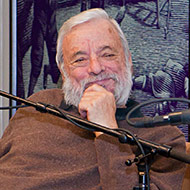
On Sunday, the New York Times ran an article about a reimagined Porgy and Bess that will be coming to Broadway this winter ÔÇö complete with a happier ending and more backstories ÔÇö from playwright Suzan-Lori Parks, directed by Diane Paulus, and starring Audra McDonald and Norm Lewis. Reworking a classic is always a fraught process, but the degree to which Paulus and Parks say theyÔÇÖre adding (and subtracting) from Porgy and Bess sounds fairly extreme, at least according to Stephen Sondheim, a very vocal admirer of the show. Sondheim wrote in to the New York Times today to lay a majestic smackdown on the project that makes for some delightfully incensed reading.
HereÔÇÖs what Mr. Sondheim had to say:
The article by Mr. Healy about the coming revival of Porgy and Bess is dismaying on many levels. To begin with, the title of the show is now ÔÇ£The GershwinsÔÇÖ Porgy and Bess.ÔÇØ I assume thatÔÇÖs in case anyone was worried it was the Rodgers and Hart Porgy and Bess that was coming to town. But what happened to DuBose Heyward? Most of the lyrics (and all of the good ones) are his alone (ÔÇ£Summertime,ÔÇØ ÔÇ£My ManÔÇÖs Gone NowÔÇØ) or co-written with Ira Gershwin (ÔÇ£Bess, You Is My Woman NowÔÇØ). If this billing is at the insistence of the Gershwin estate, they should be ashamed of themselves. If itÔÇÖs the producersÔÇÖ idea, itÔÇÖs just dumb. More dismaying is the disdain that Diane Paulus, Audra McDonald and Suzan-Lori Parks feel toward the opera itself.
Ms. Paulus says that in the opera you donÔÇÖt get to know the characters as people. Putting it kindly, thatÔÇÖs willful ignorance. These characters are as vivid as any ever created for the musical theater, as has been proved over and over in productions that may have cut some dialogue and musical passages but didnÔÇÖt rewrite and distort them.
What Ms. Paulus wants, and has ordered, are back stories for the characters. For example she (or, rather, Ms. Parks) is supplying Porgy with dialogue that will explain how he became crippled. She fails to recognize that Porgy, Bess, Crown, SportinÔÇÖ Life and the rest are archetypes and intended to be larger than life and that filling in ÔÇ£realisticÔÇØ details is likely to reduce them to line drawings. It makes you speculate about what would happen if she ever got her hands on ÔÇ£ToscaÔÇØ and ÔÇÿDon Giovanni.ÔÇØ How would we get to know them? Ms. Paulus would probably want to add an aria or two to explain how Tosca got to be a star, and she would certainly want some additional material about Don GiovanniÔÇÖs unhappy childhood to explain what made him such an unconscionable lecher.
Then there is Ms. PaulusÔÇÖs condescension toward the audience. She says, ÔÇ£IÔÇÖm sorry, but to ask an audience these days to invest three hours in a show requires your heroine be an understandable and fully rounded character.ÔÇØ I donÔÇÖt know what sheÔÇÖs sorry about, but IÔÇÖm glad she can speak for all of us restless theatergoers. If she doesnÔÇÖt understand Bess and feels she has to ÔÇ£excavateÔÇØ the show, she clearly thinks itÔÇÖs a ruin, so why is she doing it? IÔÇÖm sorry, but could the problem be her lack of understanding, not HeywardÔÇÖs?
She is joined heartily in this sentiment by Ms. McDonald, who says that Bess is often more of a plot device than a full-blooded character. Often? Meaning sometimes shes full-blooded and other times not? Shes always full-blooded when shes acted full-bloodedly, as she was by, among others, Clamma Dale and Leontyne Price. Ms. McDonald goes on to say, The opera has the makings of a great love story  that I think were bringing to life. Wow, whod have thought there was a love story hiding in Porgy and Bess that just needed a group of visionaries to bring it out?
 I can hear the outraged cries now about stifling creativity and discouraging directors who want to reinterpret plays and musicals in order to bring fresh perspectives, as they are wont to say, but there is a difference between reinterpretation and wholesale rewriting. Nor am I judging this production in advance, only the attitude of its creators toward the piece and the audience. Perhaps it will be wonderful. Certainly I can think of no better Porgy than Norm Lewis nor a better Bess than Audra McDonald, whose voice is one of the glories of the American theater. Perhaps Ms. Paulus and company will have earned their arrogance.
Which brings me back to my opening point. In the interest of truth in advertising, let it not be called ÔÇ£The GershwinsÔÇÖ Porgy and Bess,ÔÇØ nor even ÔÇ£The Gershwin-Heyward Porgy and Bess.ÔÇØ Advertise it honestly as ÔÇ£Diane PaulusÔÇÖs Porgy and Bess.ÔÇØ And the hell with the real one.
Speaking of people whoÔÇÖve earned their arrogance, Stephen Sondheim, folks!
Stephen Sondheim Takes Issue With Plan for Porgy and Bess [NYT]

